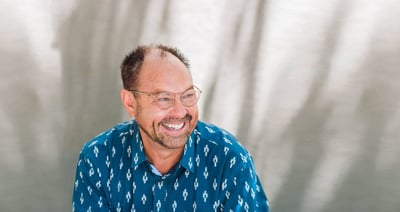Five Questions with Tim Sharp
| Faculty

With experience in higher education and choral arts, Dr. Tim Sharp is well prepared to serve as the program director for Trevecca’s Center for Community Arts Innovation. Based in Trevecca’s School of Music and Worship Arts, the center offers workshops and boot camps entirely online and is specifically designed for educators and those working in the community arts field. Sharp, who most recently was the Executive Director of the American Choral Directors Association (ACDA), also previously served as the dean of fine arts at Rhodes College in Memphis, and earlier, as the director of choral activities at Belmont University.
We recently asked Sharp a few questions about the new Center, why he’s passionate about working in higher education and if any of his hobbies or interests would surprise his students. Here’s what he had to say.
You’re the program director of the Center for Community Arts Innovation at Trevecca. Can you tell us more about the Center and what excites you about this new endeavor?The mission of Trevecca's Center for Community Arts Innovation is to identify and solve the problems between artistic training and community arts administration. The people who carve out space for the arts in their lives and communities are seeking to speak to the deeper meaning and purpose in life. We help people reach out to others who may not be served in traditional arts environments by equipping them to accomplish their mission. This is why we are so excited to be involved in local, national, and international arts communities.
We are actively engaged in providing webinars, workshops, boot camps, undergraduate and graduate level classes that will enable professional artistic practitioners to grab the tools necessary for developing successful arts programs in their community. Upcoming boot camps will focus on leadership, management, vision, leadership in times of crisis, development and fundraising.
I love that I get to help people discover their artistic dreams. I help equip and develop the skill set necessary for making them successful in today’s multicultural world.
What are some reasons prospective students should consider this program?The curricular assignments participants will take part in will encourage them to create in the communities that they live in rather than some generic outline. Most community-based programs are important to the communities they’re in and that’s where our students go to work. That’s the kind(s) of experience(s) I want participants to enjoy.
The Center looks to innovation to solve the problems that arise between artistic training and the vocational application of community arts organizations. Our approach to innovation recognizes that people are at the heart of every organization’s mission. We know that optimism guides arts leaders in the experimentation and problem solving that arises from the tension of emerging idea. Collaboration with others offers new possibilities for bringing sustainability to innovative ideas and the ongoing mission and work of any arts organization.
Why do you think a program like this is important at this moment in our country?
We have a lot going on right now with the pandemic and trying to further community arts. The Center provides a platform for equipping people with big community arts dreams with the tools they need to make those dreams come true; everything from creating community choirs and theater groups to arts ministries in prisons, homeless shelters and more. We come alongside the visions people have and help them solve the problems to make that dream a reality. Unfortunately, most arts training is about technique and not about how to be entrepreneurial, how to troubleshoot, to work with an advisory board, how to form a 501(c)3. Community arts organizations and ministries often begin with someone who’s trained in the arts—musicians, artists, actors. But, many formal training programs do not take the opportunity to develop the business and management skills necessary to ensure their organization’s success. That’s where the Center helps and equips.
What will the upcoming boot camp provide for students?
We are extraordinarily excited about this boot camp. It’s the first in a series that will help equip professionals to better serve the arts community. These boot camps courses are ONLY available through Trevecca and our first one starts March 22, 2021. The Arts Leader as Visionary, Mentor and Innovator, is a six module boot camp includes the following areas of arts preparation: 1) Establishing an Artistic Vision; 2) Artistic Leader as Mentor; 3) POETIC Mindset for Innovation; 4) Steps to Innovation; 5) Secret Sauce of Innovation-Collaboration; and, 6) Sustaining the Vision. Each module is equipped to further equip men and women already in the field in these areas of arts innovation and entrepreneurship.
You’re new to the Trevecca family. Tell us a little about yourself, your family, and something unique to you.
My family came to Nashville from Oklahoma City, where I was Executive Director of the American Choral Directors Association and my wife, Jane, was the head of the lower school at Casady School. Our daughter, Emma, just graduated from the San Francisco Conservatory of Music with an emphasis in opera performance. We were originally from the Nashville area and knew that when we completed our work in Oklahoma we would be returning to Nashville. We are happy to be back. Something unique to me is that I love playing bluegrass music on my banjo. I really enjoy it when I can go to a bluegrass festival in my restored 1958 Airstream.
